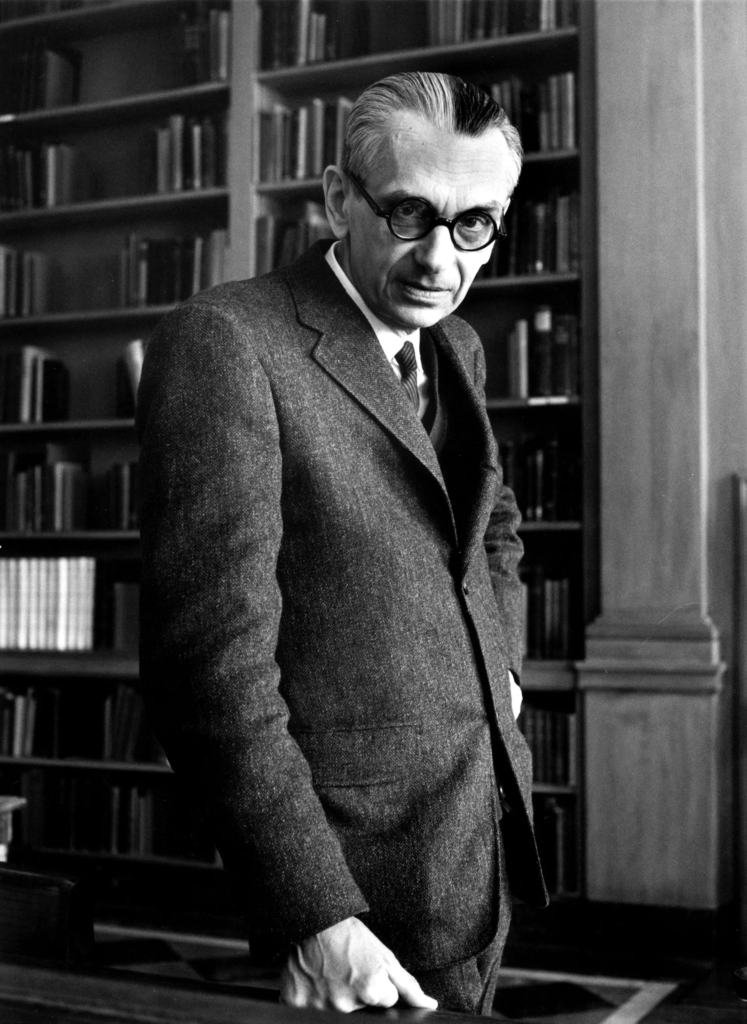
Kurt Gödel, a 20th century mathematician and logician, is regarded as one of history’s greatest scientific minds. His most notable works are his two “Incompleteness Theorems,” published by Gödel in 1931 at the age of 24, which are the most important logical proofs of the century. In short, Gödel showed that any system of knowledge will always be incomplete. That is, there will always be true statements that cannot be proven. This idea sent tremors through the scientific community. In an era where scientists like Albert Einstein, Stephen Hawking, and Nikola Tesla dedicated their lives to solidifying our understanding of the world, Kurt Gödel proved that this was impossible.
With the Third Reich’s annexation of Austria in 1938, Gödel became a German national. Having formed close connections with Jewish scientists in the Vienna Circle during his career, he feared capture by the Gestapo and fled to the United States. He found himself working at the Institute for Advanced Studies at Princeton University, where he developed close friendships with Albert Einstein and Oskar Morgenstern, co-founder of the field of game theory. A decade later, while studying for his citizenship test, Gödel allegedly found an inner contradiction in the Constitution of the United States that would permit the American democracy to legally become a dictatorship. However, there is no record of the details of his discovery in Morgenstern’s accounts. A Gödel scholar, F.E. Guerra-Pujol, labels this as one of the great unsolved problems of constitutional law. A 2021 article by Adam Gopnik in The New Yorker aptly addresses the dilemma, stating “Kurt Gödel never defined the constitutional loophole he’d found but he was far too exacting a logician not to have spotted something.”
In an era where scientists like Albert Einstein, Stephen Hawking, and Nikola Tesla dedicated their lives to solidifying our understanding of the world, Kurt Gödel proved that this was impossible.
Over the years, several people have speculated about the particulars of this loophole. Laurence Tribe, professor emeritus at Harvard Law School, suggests that Gödel was potentially talking about Article V, since it sets no limits on how the Constitution can be amended. This is the most common theory about Gödel’s loophole, and it suggests that since Article V is self-referential in a way that leaves open the possibility for it to amend itself. This forges a direct route to dictatorship: amend the Constitution so that any command from the President can override or amend the Constitution.
Another rather curious theory is that Gödel was referring to Article I, Section 8, Clause 5 — the Weights and Measures clause — which grants Congress power to “fix the standard of Weights and Measures.” This includes the authority to adjust the calendar and measures of time. Congress exercises this power to adopt daylight saving time. The theory is that Congress could pass a law redefining the meaning of a year to 100 revolutions of the Earth around the Sun. In effect, this would indefinitely extend the terms of government officials like presidents, senators, and congressional representatives. Of course, both theories have numerous contradictions and are unlikely to be enacted in reality. However, a proposition like this is becoming of a highly intelligent and logical mind, yet one without any legal or constitutional training.
Upon further inspection, there are an overabundance of possible loopholes in the Constitution. For example, presidential impeachment is reserved for a strong violation of the law, namely “high crimes and misdemeanors.” However, this term is not defined in the Constitution and is effectively whatever a significant number of legislators decide. The ambiguity here, while likely a design choice to ensure timeless relevance of the Constitution, in essence allows the impeachment process to simply be an ejection seat when a party has sufficient majority in both houses. Another perspective is that there is no need to find a logical flaw in the Constitution because, like any other legal document, it inevitably contains flaws, traps, inconsistencies, and ambiguities.
To those who don’t respect the Constitution in the first place, the true loophole is not a string of words in a 250-year-old document, but it is the naïveté and deluded optimism of the populace.
On a larger scale, this speaks to the significance of law. Gödel’s contemporary and philosophical opposite Ludwin Wittgenstein comments on this issue, saying, “We don’t follow the rules as much as we inhabit them. Without a social consensus of commitment to the law, no law matters.” The truth is that constitutional logic is not necessary for an autocrat to take power if they have no respect for the Constitution in the first place. Especially in present times, we have come to realize that the power of the Constitution correlates with our commitment to its authority. Gödel was naïve as to where the real trick clauses could be found. To those who don’t respect the Constitution in the first place, the true loophole is not a string of words in a 250-year-old document, but it is the naïveté and deluded optimism of the populace.
Husain Master ‘27 studies in the College of Arts & Sciences. He can be reached at h.a.master@wustl.edu.